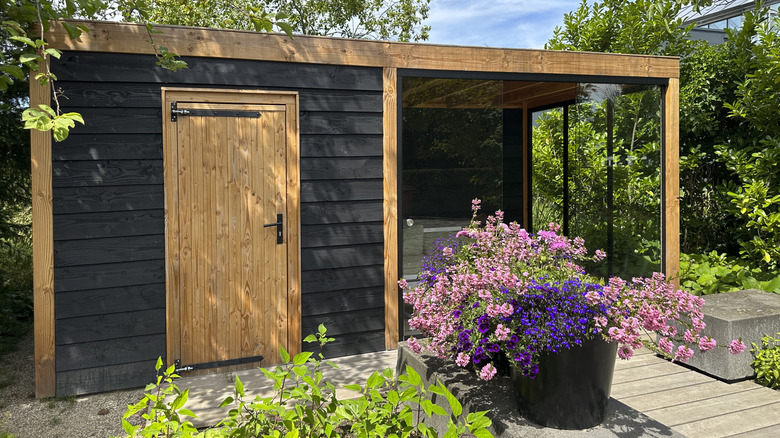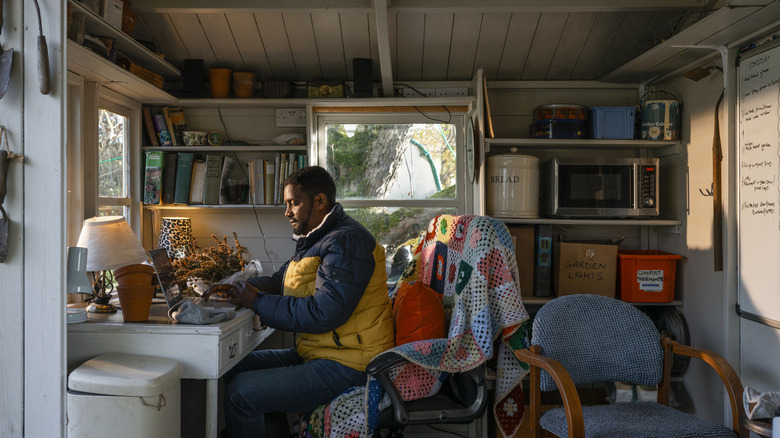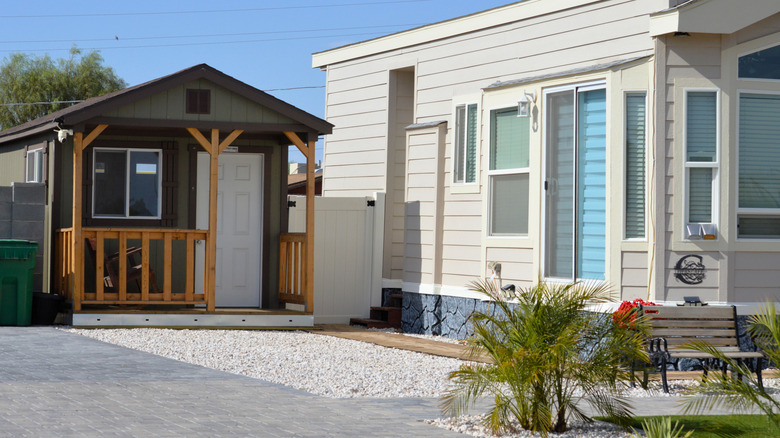Can You Legally Rent Out A Livable Shed Space For Extra Income?
With rents spiking and homeownership slipping out of reach for many Americans, housing has shifted dramatically in recent years. Tiny homes are on the rise, as people embrace smaller and simpler spaces that prioritize efficiency and environmentally conscious living over the sprawling square footage that often goes hand-in-hand with suburban living. Although you can build or purchase a tiny house for a fraction of what it costs to build a standard house, some homeowners are taking things one step further by converting backyard sheds into livable units. In some cases, these conversions are driven by an immediate need for additional living space for adult children who are moving back home or aging parents who want independence but need loved ones nearby. For others, it's hard to overlook the extra income potential. According to Danny Karon, consumer law attorney, university lecturer, and author of "Your Lovable Lawyer's Guide to Legal Wellness," you'll need to carefully consider building codes, zoning, and other requirements in your local area to legally rent out a livable shed space.
"In most municipalities, it is not automatically legal to just rent out a shed or a storage facility or any sort of backyard unit, even if it's been converted into a so-called tiny home or accessory dwelling unit, also known as ADUs," Karon told House Digest during an exclusive interview. From garage apartments to basement suites, ADUs are increasingly seen as a housing solution in many areas. But that doesn't mean that you can just throw a futon and a composting toilet inside your shed and call yourself a landlord.
Renting out a shed legally depends on where you live
"For someone to be able to rent out such a unit legally, the space must meet specific building codes, zoning ordinances, and safety standards set by each municipality," Danny Karon explained during his exclusive interview with House Digest. He added that this will include making sure any tenants have access to functional utilities like plumbing, electricity, heating, and cooling. Your converted shed will also need to meet certain ceiling height and emergency exit requirements. "Not meeting the required standards and renting it out anyway could result in hefty fines, eviction orders, and some serious liability issues if anything were to go wrong," Karon cautioned. These are just a few of the things you'll need to consider before becoming a landlord. Insuring outbuildings is also a complex undertaking, and finding a company that will cover your converted shed with both property and landlord insurance may prove challenging.
Whether you can legally rent out a shed or not largely depends on where you live. "California, for instance, has statewide laws that significantly ease and streamline the process for renting out an ADU," Karon said. Oregon and California are also ADU-friendly states on the West Coast, while Connecticut and Maine realize the potential for easing the housing crisis with ADUs on the East Coast. "But other states, such as Alabama and New York, have more restrictive laws in place, making it much more difficult, and some towns and homeowners' associations forbid them entirely," Karon added.
What else you need to know to avoid legal issues
So what should you do if you have an empty shed with housing potential? "Renting out a unit on your property can be a fantastic way to earn some extra income and pad your mortgage payment, but ignoring the legal process can land you in some serious trouble, facing stiff fines," Danny Karon told House Digest during his exclusive interview. The legal expert thinks it's a great idea, but only if you've done your research and followed all the proper guidelines. Although there are plenty of ways a shed can completely transform your backyard, you should be realistic about what it will be like to have someone living in yours. What seems like an easy income stream can quickly become a challenging daily complication, especially if you love your privacy or spending time outdoors.
If you're set on renting out your shed, Karon advised contacting your local planning and zoning offices first, especially since regulations vary so widely. "They'll want to review local building codes for specific requirements in terms of minimum square footage, ceiling height, and utilities offered while also checking out rental ordinances," he explained. Karon also said that some municipalities regulate how long tenants have to stay in order to qualify as a rental, a topic that's becoming more common as Airbnb and other guests turn long-term stays into tenants' rights issues. Karon suggested seeking out help from a professional before listing your shed for rent. "Consult an attorney if you're unsure, specifically if you intend to generate considerable income from the rental."


